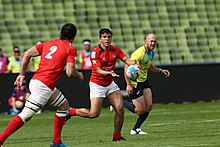Passport (sport)
A pass (from French passer : “hand over, give”) is understood in many team sports as the handing over of the game equipment (“play, pass”) within a team to overcome the area of a playing field .
Playing with passes is predominantly typical for ball sports, for example in American football, basketball, soccer, handball, rugby, etc. In some cases, passes are named with individual names.
When playing the game of passing, the rules of the respective sport must be observed, as these may prescribe or prohibit play under certain conditions, e.g. B. in handball (see time game ) or in football (see return pass rule ). Most of the time, however, it is the logical consequence that underlies the size of the playing field (e.g. American football ).
Variants of the pass
The following names for passes are examples that can appear in several sports. “Ball” also stands for other play equipment in the text.
- The general form of pass, without any particular technique or situation, is usually just called “pass”; however, the term “simple passport” is rarely used.
- Short pass: The ball is quickly passed to one of the closest players.
- Long pass: A long pass is a ball delivery over a long distance.
- Cross pass: With a cross pass, the ball is played across the width of the playing field (parallel to the baseline);
- Diagonal pass: the ball is played diagonally forward.
- Double pass: Passes made several times in a row between two or more players of the same team
- Back pass: The surrendering player plays the game device backwards, for example to his goalkeeper or another player.
- Steep pass: The steep pass is a pass into free space. It is a pass into the anticipated path of one's own player, often to overrun opposing players or the entire defense.
Other passport terms
- Bad pass: In the case of a bad pass, the handover of the respective play equipment fails. Instead of a player from your own team, the opposing team gains possession (directly or indirectly). Passes that accidentally score a point (e.g. goal) are usually not considered bad passes.
- Blind pass (English no-look pass) Passes in which the player being played is not in the field of vision of the pass giver are called blind passes.
